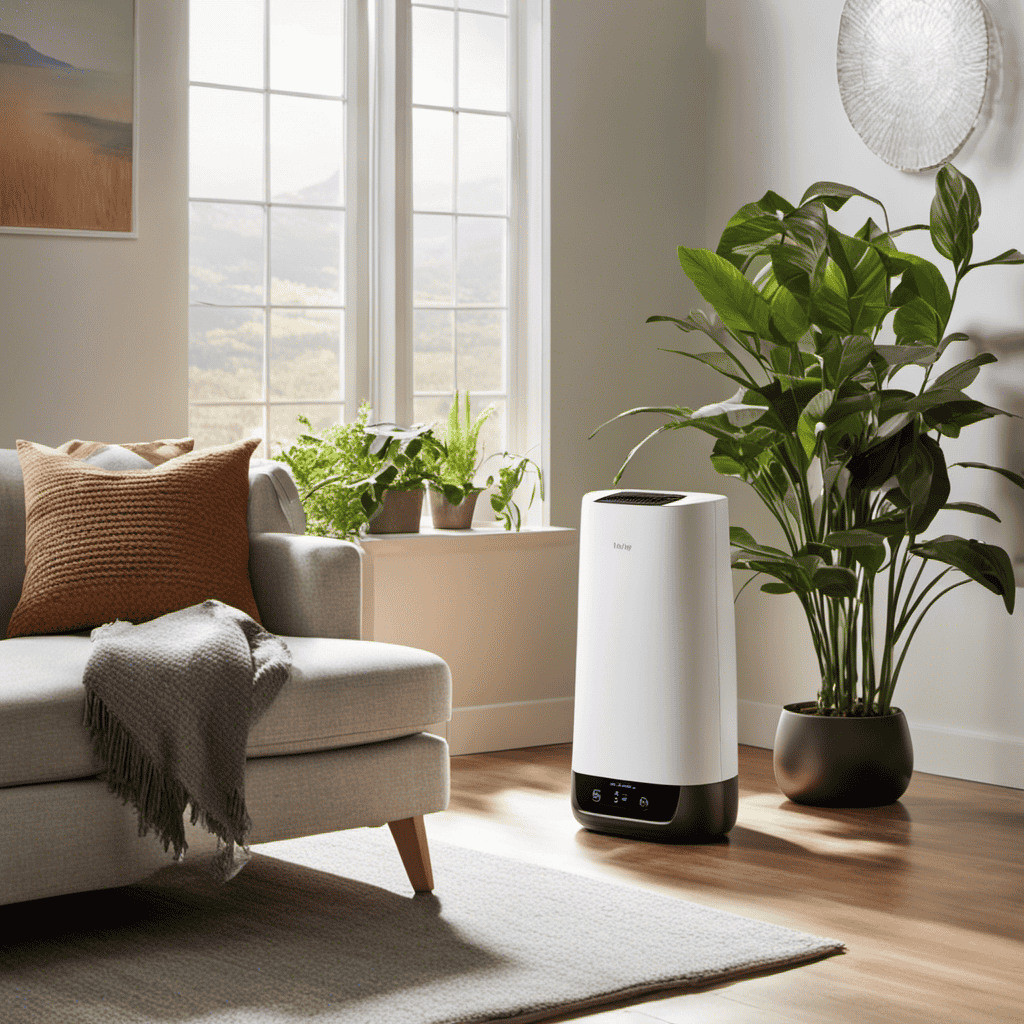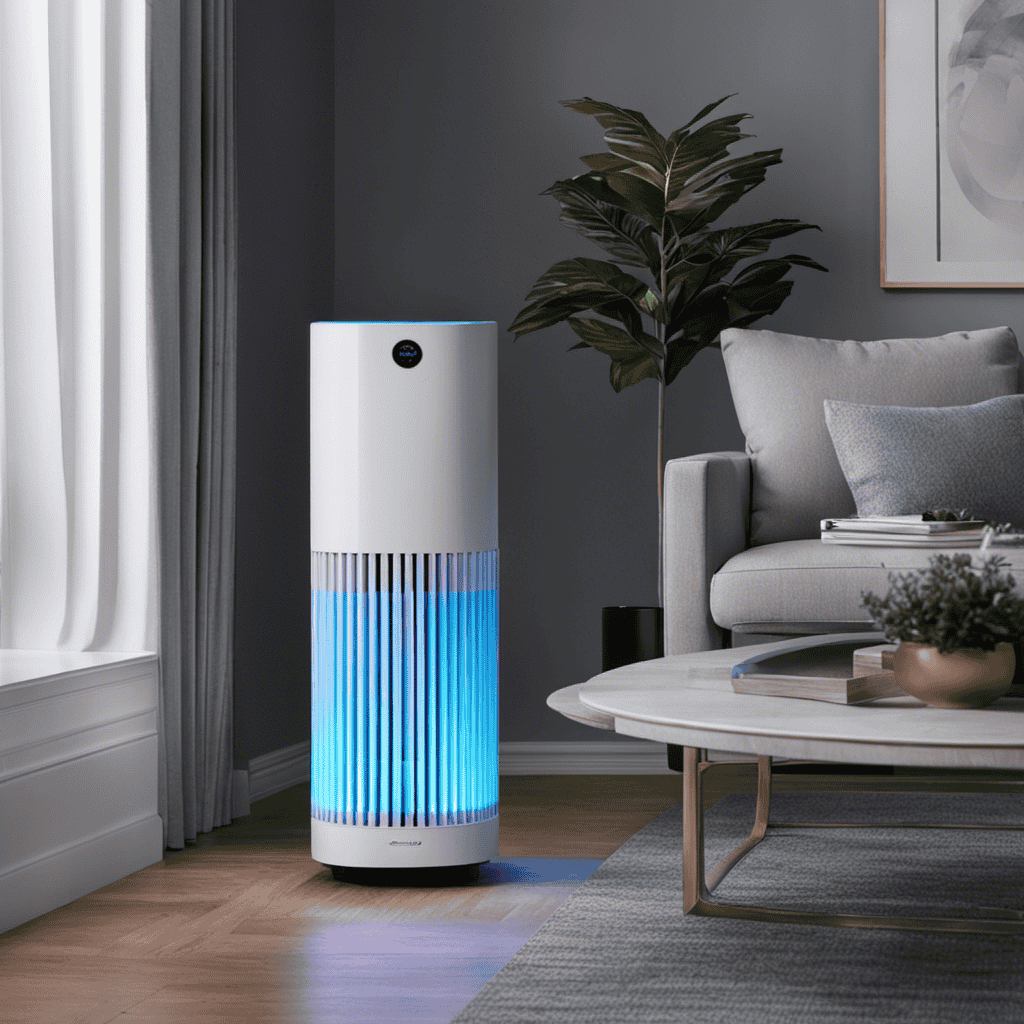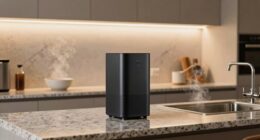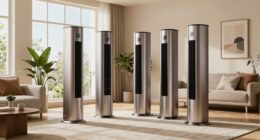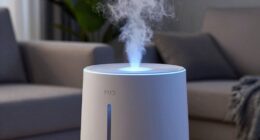I have an amazing discovery to share with you! Have you ever been curious about the function of an ionizer in an air purifier? Get ready because I’m going to explain the secrets behind this advanced technology.
In this article, we’ll dive deep into the workings of an ionizer, discuss its benefits, debunk common misconceptions, and even explore the potential health effects.
So, brace yourself for an eye-opening journey as we navigate the world of air purifiers with ionizers!
Key Takeaways
- Ionizers use electrically charged ions to remove particles from the air.
- Ionizers reduce allergens and pollutants in the air, improving indoor air quality.
- Ionizers can help eliminate odors and neutralize charged particles.
- Ionizers have the potential to produce ozone, which can be harmful to human health.
How Does an Ionizer Work
An ionizer uses electrically charged ions to remove particles from the air, making it cleaner and healthier to breathe. The technology behind ionizers is based on the principle of ionization, where ions are generated and released into the air.
These ions attach themselves to airborne particles such as dust, pollen, and pet dander, causing them to become negatively charged. Once negatively charged, these particles are attracted to positively charged surfaces, such as walls or furniture, and are effectively removed from the air.
This process not only removes visible particles but also microscopic ones that can cause allergies and respiratory issues. The benefits of using an ionizer include improved indoor air quality, reduced allergens, and a cleaner living environment.
Ionizer technology is continuously evolving, with advanced features such as HEPA filters and UV-C light to enhance the air purification process and provide even better results.
Benefits of Using an Air Purifier With Ionizer
Using an air purifier with an ionizer can provide several benefits for your home.
Ionizer technology works by releasing negatively charged ions into the air, which attach to airborne particles like dust, pollen, and pet dander, making them heavier and causing them to fall to the ground. This helps to reduce the number of allergens and pollutants in the air, improving indoor air quality.
Additionally, ionizers can help eliminate odors by neutralizing the charged particles that cause them. They can also help to reduce the spread of bacteria and viruses in the air, making your home a healthier environment.
With an air purifier that includes an ionizer, you can enjoy cleaner, fresher air and the peace of mind that comes with knowing your home’s air is being purified.
Understanding the Ionization Process in Air Purifiers
You’ll understand how ionization works in air purifiers once you learn about the release of negatively charged ions into the air. The ionization process in air purifiers involves the use of ionizer technology advancements to improve air quality.
Here’s an explanation of how the ionization process works:
-
Ionization: Air purifiers with ionizers release negatively charged ions into the air. These ions attach to airborne particles, such as dust, pollen, and pet dander, making them heavier and causing them to fall to the ground or stick to surfaces.
-
Electrostatic attraction: The negatively charged ions attract positively charged particles, which are commonly found in pollutants like smoke and odors. This electrostatic attraction helps to remove these particles from the air.
-
Clumping effect: When the particles become heavier and clump together, they are easier to capture by the air purifier’s filters or to be removed during regular cleaning.
-
Enhanced filtration: By combining ionization with filtration, air purifiers can effectively remove a wide range of airborne pollutants, improving indoor air quality and reducing the risk of respiratory problems.
With advancements in ionizer technology, air purifiers can now provide more efficient and effective air purification, ensuring cleaner and healthier indoor air.
Comparing Air Purifiers With and Without Ionizers
In my research on air purifiers, I have come across a subtopic that focuses on comparing air purifiers with and without ionizers.
This discussion delves into the effectiveness of ionizers in purifying the air, the benefits of using ionizer-equipped purifiers, and a comparison of the performance between ionizer and non-ionizer air purifiers.
It is important to explore these key points in order to make an informed decision when choosing an air purifier for optimal air quality in indoor spaces.
Ionizer Effectiveness in Purifying
To effectively purify the air, an ionizer releases negatively charged ions that attach to airborne particles and help remove them from your breathing space. Ionizer technology has made significant advancements in recent years, improving their effectiveness and ease of maintenance.
Here are four key points to understand about ionizer technology advancements:
-
Enhanced filtration: Modern ionizers are equipped with advanced filters that can capture even smaller particles, including allergens, bacteria, and viruses. This ensures a higher level of air purification and improved overall air quality.
-
Self-cleaning feature: Many ionizers now have a self-cleaning function that reduces the need for manual maintenance. This feature helps prevent the accumulation of harmful substances on the ionizer plates, ensuring consistent performance and longevity.
-
Energy efficiency: With advancements in technology, ionizers have become more energy-efficient. They consume less power while still providing effective air purification, helping you save on electricity bills.
-
User-friendly controls: Ionizers now come with user-friendly controls, including digital displays and remote control options. These features make it easier to monitor and adjust the ionizer settings, ensuring optimal air purification for your specific needs.
Benefits of Ionizer-Equipped Purifiers
With ionizer-equipped purifiers, you can enjoy cleaner and fresher indoor air. Ionizer technology plays a crucial role in improving air quality by removing harmful particles and pollutants from the air.
These purifiers work by releasing negatively charged ions into the air, which attach themselves to positively charged particles such as dust, pollen, and pet dander. This process causes these particles to become heavier and fall to the ground or get trapped in the purifier’s filters.
By effectively removing these pollutants, ionizer-equipped purifiers can greatly reduce the presence of allergens and irritants in the air, providing relief for individuals with respiratory conditions or allergies. Furthermore, ionizers also help to neutralize odors by breaking down the molecules that cause unpleasant smells.
In the next section, we will explore the performance differences between ionizer and non-ionizer purifiers, allowing you to make an informed decision when choosing the right air purifier for your needs.
Ionizer Vs. Non-Ionizer Performance
The performance of ionizer-equipped purifiers differs from that of non-ionizer purifiers. Ionizers release negatively charged ions into the air, which attach to positively charged particles such as dust, pollen, and bacteria, causing them to become heavy and fall to the ground. This process improves the overall air quality by reducing the number of airborne pollutants. However, it is important to consider the efficiency and performance of ionizers before making a purchase decision.
Here are some key points to consider:
-
Ionizer efficiency: Ionizers can effectively remove small particles from the air, but their efficiency may vary depending on the model and design.
-
Ionizer performance: Some ionizers may produce ozone as a byproduct, which can be harmful to human health. It is crucial to choose an ionizer that meets safety standards and has low ozone emissions.
-
Maintenance requirements: Ionizers require regular cleaning to ensure optimal performance. Accumulated dirt and debris on the ionizer plates can reduce efficiency over time.
-
Cost-effectiveness: While ionizer-equipped purifiers may have higher upfront costs, they can be more cost-effective in the long run due to their ability to remove particles without the need for filter replacements.
Considering these factors will help you make an informed decision when choosing between ionizer and non-ionizer purifiers.
Common Misconceptions About Ionizers in Air Purifiers
When it comes to ionizers in air purifiers, there are several key points to consider.
Firstly, ionizers have been known to produce ozone, which can be harmful to human health.
Secondly, the effectiveness of ionizers in purifying the air is a subject of debate, with some studies showing positive results and others showing little to no improvement in air quality.
Lastly, there are health concerns associated with the use of ionizers, such as respiratory irritation and potential long-term effects on lung function.
Ionizers and Ozone Production
Ionizers can help improve air quality by releasing ions into the air. However, it is important to understand the implications of ionizers on ozone production and the necessary maintenance to ensure their effectiveness and safety.
Here are some key points to consider:
-
Ozone regulation: Ionizers have the potential to produce ozone, a molecule that can be harmful to human health in high concentrations. It is crucial to choose an ionizer that complies with ozone regulation standards to ensure the air remains safe to breathe.
-
Ionizer maintenance: Regular maintenance is essential to keep ionizers functioning optimally. This includes cleaning the ionizer plates or filters to prevent the buildup of dust and other particles that can hinder its performance.
-
Monitoring ozone levels: It is recommended to regularly monitor the ozone levels in your indoor environment when using an ionizer. This can be done using an ozone meter to ensure that the concentration remains within safe limits.
-
Proper ventilation: Adequate ventilation is necessary when using an ionizer to prevent the accumulation of ozone and maintain a healthy indoor environment. Opening windows or using an exhaust fan can help remove any excess ozone.
Effectiveness of Ionizers
Using an ionizer can help improve indoor air quality by releasing ions into the environment. Research studies have shown that ionizers can effectively remove certain airborne particles, such as dust, pollen, and pet dander, from the air. This can be particularly beneficial for individuals with allergies or respiratory conditions. Some studies have also suggested that ionizers may have antimicrobial effects, helping to reduce the spread of bacteria and viruses in the air.
However, it is important to consider the potential drawbacks of using ionizers. While they can effectively remove larger particles, they may not be as effective at removing smaller particles or gases. Additionally, some ionizers produce ozone as a byproduct, which can be harmful to human health.
It is crucial to weigh the pros and cons and consider the findings of research studies before deciding to use an ionizer in your home.
Health Concerns With Ionizers
You should be aware of potential health concerns associated with ionizers, such as the production of ozone as a byproduct. While ionizers are effective at removing airborne particles, they can have negative effects on individuals with allergies or respiratory conditions. Here are four important points to consider:
-
Ozone production: Ionizers release ozone into the air, which can be harmful when inhaled in high concentrations. Ozone can irritate the respiratory system and worsen symptoms in individuals with allergies or asthma.
-
Elevated particle levels: Ionizers can create high levels of charged particles in the air, leading to increased indoor pollution. These particles can trigger allergic reactions and respiratory symptoms in sensitive individuals.
-
Maintenance requirements: Ionizers require regular cleaning and maintenance to prevent the buildup of pollutants on the device. Failure to clean them properly can lead to the release of contaminants into the air.
-
Lack of regulation: Unlike air purifiers, ionizers are not regulated by specific standards. This means that the quality and safety of ionizers can vary greatly.
Considering these potential health concerns, it is important to carefully evaluate the use of ionizers, especially for individuals with allergies or respiratory conditions.
Potential Health Effects of Ionizers in Air Purifiers
The potential health effects of ionizers in air purifiers should be carefully considered. While ionizer technology can improve indoor air quality by removing airborne particles and odors, there are also potential risks associated with the use of these devices. Research suggests that ionizers can generate ozone, a harmful pollutant that can irritate the respiratory system and contribute to the development of respiratory conditions such as asthma and allergies. Additionally, some studies have found that ionizers can produce negative ions, which can react with other pollutants in the air to form harmful byproducts. To help you understand the potential health effects of ionizers in air purifiers, I have created the table below:
| Potential Health Effects | Ionizer Technology |
|---|---|
| Increased Ozone Levels | Yes |
| Respiratory Irritation | Yes |
| Allergy and Asthma Risk | Possible |
It is important to consider these potential risks before using an air purifier with an ionizer.
Choosing the Right Air Purifier With Ionizer for Your Needs
When selecting an air purifier with an ionizer, it’s crucial to consider your specific needs and preferences. Here are four important factors to keep in mind:
-
Ionizer maintenance: Regular cleaning of the ionizer plates is essential to ensure optimal performance. Follow the manufacturer’s instructions for cleaning and maintenance to keep the ionizer functioning effectively.
-
Ionizer safety precautions: Ionizers produce ozone, which can be harmful in high concentrations. Look for air purifiers with low ozone emissions and consider the size of the space where the purifier will be used. It’s important to ensure proper ventilation to prevent ozone buildup.
-
Filter type and efficiency: In addition to the ionizer, consider the type and efficiency of the filters used in the air purifier. Look for HEPA filters, which are highly effective at capturing small particles and allergens.
-
Noise levels: Some ionizers can be noisy, so consider the noise levels of the air purifier when making your selection. Look for models with adjustable fan speeds to customize the noise level to your preference.
Frequently Asked Questions
Are Ionizers Safe to Use in Air Purifiers?
I’ve studied the pros and cons of using ionizers in air purifiers. While they can effectively remove airborne bacteria, it’s important to note that some ionizers may emit ozone, which can be harmful in high concentrations.
Can Ionizers Remove All Types of Pollutants From the Air?
Ionizers are effective in removing airborne bacteria, improving indoor air quality in various environments. They utilize charged ions to attract and neutralize pollutants. However, their effectiveness may vary based on factors such as room size and pollutant concentration.
Do Air Purifiers With Ionizers Produce Any Harmful Byproducts?
Yes, air purifiers with ionizers can produce some harmful byproducts, such as ozone. However, it is important to note that ionizers are effective in removing airborne viruses and can be an alternative to HEPA filters.
Can Ionizers Help With Allergies and Asthma?
Ionizers can be effective in reducing respiratory symptoms related to allergies and asthma. However, it’s important to note that there may be potential side effects associated with using ionizers for allergy and asthma relief.
How Often Should the Ionizer in an Air Purifier Be Cleaned or Replaced?
Cleaning or replacing the ionizer in an air purifier is crucial for optimal performance. Regular maintenance ensures the removal of harmful particles and promotes cleaner air. Don’t neglect this step, as it directly impacts the benefits of using an air purifier ionizer.
Conclusion
In conclusion, after extensive research and analysis, it is quite fascinating to discover that the ionizer feature in air purifiers may not be as beneficial as initially thought. Despite its claims of improving air quality, there are potential negative health effects to consider. It may seem ironic that a device designed to purify the air could have such drawbacks.
Therefore, when selecting an air purifier with an ionizer, it is essential to carefully weigh the potential benefits against the potential risks. It is crucial to consider all aspects before making a decision. This way, you can ensure the best possible air quality for your specific needs.


